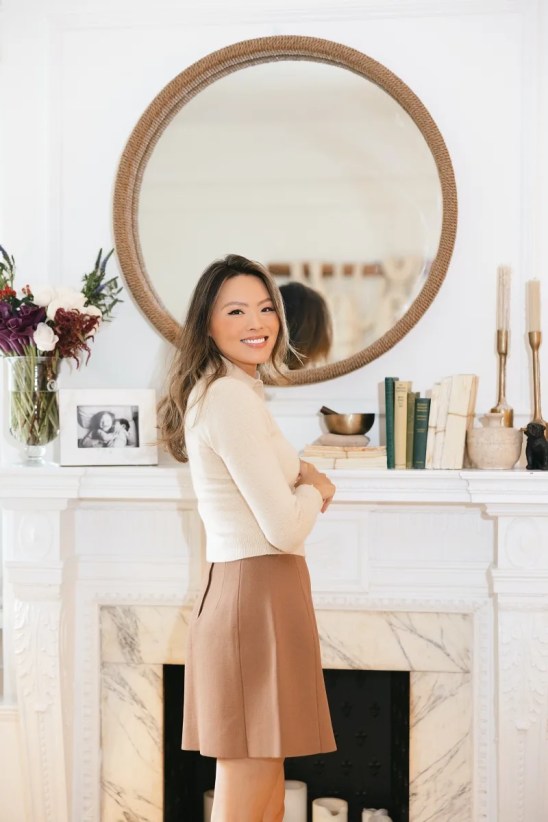Girls need to hear words that accurately describe them in a positive light on a regular basis. A 2014 study from University of California, Los Angeles, found that girls who had been called “too fat” by family members and peers were more likely to be obese a decade later. The study also showed that labeling children as “fat” to motivate them to lose weight seemed to stigmatize them rather than help achieve that goal.
When my daughter was in fourth grade, we were sitting in my bedroom on the end of my bed when she made the teary announcement that she was “fat” compared to her gaggle of friends, who were all quite lean at the time.
Naturally, I said she was not fat. I said she just happened to have lean friends, but not everyone in the world was thin. I suggested she try the word “curvy” to describe herself, because saying fat in that manner seemed demeaning to herself.
I emphasized that there was nothing wrong with being curvy, that many girls and women are curvy, and that being curvy is something to be proud of, not anything to be embarrassed about.
She sniffled, wiped away a couple of tears, and seemed intrigued by the idea. “Who else is curvy?” she wanted to know.
I rattled off a few famous curvy women off the top of my head. Beyoncé. JLo. Jennifer Hudson. Katy Perry. Each time she recognized a name, she seemed to brighten up a bit.
“What about at my school? Who is curvy at my school?” She seemed dubious. But I was able to come up with several girls who were curvy like her, and some who were even curvier.
“So I am curvy?” she said the word as though tasting a new food she wasn’t sure she was going to swallow. “Will I always be curvy? Will I ever get to be skinny?”
It seemed best to just level with her. “Honey, you will always be curvy. Curvy is who you are. You were born this way, and you will probably always be curvy.”
I held my breath a bit, unsure a definitive statement like this was really appropriate. All I knew was I did not want to encourage her to attempt to diet in an effort to be skinny like her friends, as I had constantly done in middle school. Middle school was still a year and a half away for her at the time.
Curvy has since become a part of my daughter’s identity. Several years later, curvy is a word Samantha uses to describe herself with pride and self-acceptance rather than disappointment and self-pity. Lucky I chose this word, because although Samantha is more physically fit today than she has ever been, puberty has gifted her with more curves in more places than she ever could have imagined in fourth grade, I’m sure. But it’s all right, because I know she feels like she is part of a secret club, the curvy girl club, with millions of unofficial members around the globe.
After reading about the study, I recognize the negative impact a parent’s words can have on a child. Perhaps our daughters would benefit from a greater variety of positive words to describe them, rather than sticking with the usual suspects like “fat” or “thin.”
Maybe if we encourage our daughters to embrace words they proudly identify with, those words can become like a badge that connects them to millions of other girls around the globe, instead of an indication that something might be wrong with them or set them apart from normal, whatever that is.
We all want to fit in; this is human nature. But viva the curvy girls, the nerdy girls, and the outrageous girls! Here’s to encouraging girls to be more self-accepting, so they don’t have to waste their energy on a daily basis trying in vain to change things about themselves they cannot change.
I have put as many positive words on this list as I could come up with, and feel free to add your own. Discuss these words with your daughter. Pay her an honest compliment. She will own the words she wants to keep. And if she does not seem to recognize herself in a positive word that describes her accurately, keep the discussion going until she does.
Two sayings seem to be at work here. The first is “the truth will set you free.” The second is “acceptance is the answer to all of my problems today.”
Assertive, Able, Adventurous, Approachable, Ambitious, Amazing, Affectionate, Ardent, Awesome, Artistic, Articulate
Brave, Bright, Balanced, Boundary-aware, Beautiful, Brilliant
Creative, Confident, Curious, Collaborative, Clear, Committed, Courageous, Conscientious, Compassionate, Conflict-resolver, Competent, Clever, Considerate, Curvy
Decisive, Daring, Delightful
Enthusiastic, Expressive, Empowered, Expressive, Educated, Energetic, Encouraging, Easy-going, Emotionally intelligent
Funny, Fair, Forgiving, Friendly, Fit, Flexible, Fierce, Focused, Friendly, Financially fit, Feminine, Fabulous
Generous, Gracious, Graceful
Helpful, Humorous, Humble, Honest, Healthy
Insightful, Imperfect, Independent, Imaginative, Informed, Inspiring, Intentional, Integrated, Industrious, Intelligent, Inventive
Jovial, Joyful, Joyous
Kind, Knowledgeable, Keen
Loving, Literate, Leads-by-example, Loveable, Laid-back
Mighty, Mindful, Motivated, Musical, Muscular
Nerdy, Nice, Naughty
Orderly, Open-minded, Optimistic, Outrageous
Polished, Progressive, Powerful, Passionate, Practical, Purposeful, Positive, Present, Patient, Playful, Plucky
Questioning
Rhythmic, Resilient, Responsive, Relaxed, Responsible, Respectful, Reliable, Resourceful, Rebellious
Sassy, Spirited, Strong, Stylish, Spiritual, Self-respectful, Self-nurturing, Silly, Sensible, Sincere, Smart, Shapely
Tolerant, Talented, Teachable, Trusting, Transformational, Tactful, Thoughtful, Tricky
Understanding, Unique, Uplifting
Versatile, Vocal, Value-based, Verbal, Vulnerable
Willing, Warmhearted, Wise
Xtra-special
Youthful
Zany
Author and journalist Christina Katz enjoys writing about empowering girls and women. Words that describe her are articulate, brave, creative, confident, curious, and many others you will find here that likely also describe you and your daughter.





















